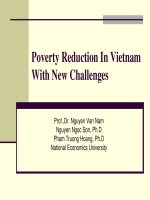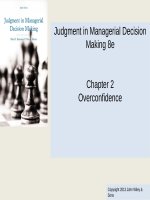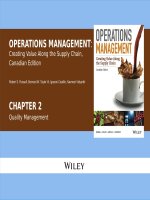Semantics chapter 2 PG-WORD MEANING
Bạn đang xem bản rút gọn của tài liệu. Xem và tải ngay bản đầy đủ của tài liệu tại đây (108.9 KB, 34 trang )
CHAPTER 2
WORD MEANING
Word Definition
A word is a dialectical unity of form and content, an independent
unit of language to form a sentence by itself.
book, bookish: words
-ish:
not word
+ Unity of form (formal unity):
Formal unity separates the word from word groups whose
components possess a certain structural freedom,
e.g. book, table, chair, eat, nice, tall, short:
words
bright light, to take for granted:
word groups
+ Unity of meaning: a word conveys only one concept.
e.g. a blackbird
(a type of bird – chim hét)
A word group: Each word in the group conveys separate
concepts
e.g. a black bird
black: a colour
bird: a kind of living creature
(con chim màu đen)
Forms and Expressions
Eg: There is no way of telling what it is.
There are 9 forms but only 8 expressions
Words and word forms are distinguished from each
other in terms of lexical and grammatical meanings
I have a book.
I do not like what you do everyday.
Forms and Expressions
Forms of one and the same word have the
same lexical meaning.
Different words have different lexical
meanings.
Lexical and Grammatical meaning revisited
- Different forms of the word will have the same lexical
meaning, but different grammatical meanings.
eg: lovely, lovelier, loveliest
- Different words may have the same grammatical meaning
but different lexical meanings.
eg: love, hate, eat, drink
Polysemy vs. Homonymy
• Homonymy
Homonyms (Gr. homes (similar) + onoma (name): words identical
in pronunciation and/or spelling, but different in meaning. They are
not connected semantically (They have no semantic relation). They
are quite different words.
• He ran fast. (quickly)
• They stand fast. (firmly)
• Who feasts till he is sick, must fast till he is well. (go without food)
(proverb)
• A clean fast is better than a dirty breakfast. (proverb)
Homonymy
A relation that holds between two lexemes that have the same form with
unrelated meanings
• Homophones
• Homographs
• Full homonyms
Partial homonyms
Homonymy
-
Absolute homonymy should satisfy the following three
conditions:
1. They will be unrelated in meaning
2. All their forms will be identical
3. The identical forms will be grammatically equivalent
Eg: bank, sole (a fish, and bottom of the foot or shoe)
Homonymy
- Partial homonymy: Find (v) and found (v) share
found (past tense form of find), and the base found.
+ Depending on the sameness of forms, including
pronunciation and spelling, homonymy may be
classified into: Full homonymy, homophones,
homographs
Homonymy
-
Full homonymy: identical in both
Bark (outer covering of a tree / noise made by a dog)
-
Homophones: identical in pronunciation only: sun vs son
-
Homograhps, identical in spelling only: wind (n, a
current of air) and wind (v, to empower a clock)
•
•
•
•
The sons raise meat.
The sun’s rays meet.
Depend / deep end
The playwright on my right thinks it right that some
conventional rite should symbolize the right of every
man to write as he pleases.
Polysemy vs. Homonymy
• Polysemy
– two or more words/expressions with the same form and related
meanings
• The property a lexeme has when it has a number of closely
related meanings.
–
–
–
–
–
Get your hands off me!
Does anyone have a watch with a second hand?
Could you give/lend me a hand with the table, please?
How many extra hands will we need to help with the harvest?
The police have the situation in hand (= under control) .
Polysemy – examples
• foot
– of a person
– of a bed
– of a mountain
• Run
– a person does
– water does
– a nose does
• Head:
– object on top of your body
– top of a glass of beer
– person at the top of a company/department
Synonymy
• Synonyms are words (two or more) of the same part of
speech, similar in their denotational meaning, but different in
their phonetic and graphic forms, connotational meaning
and combinability.
to help, to aid, to assist, to succour
main, chief, principal
Father and dad differ in terms of connotation rather than
denotation
Synonymy
Absolute synonymy: Two or more expressions are
absolute synonyms if and only if, they satisfy the
following three conditions:
1. All their meanings are identical
2. They are synonymous in all contexts
Synonymy
3. They are semantically equivalent on all
dimensions of meanings and descriptive and
non-descriptive
Eg: Semantics and semasiology
Synonymy
-
Partial synonyms: big/large
Near synonyms: mist/ fog; stream/ brook (they differ in
terms of denotation)
There are about 8000 synonymic groups in English. A
synonymic group is a group of all synonyms
Eg: principal, main, important
Synonymy
Synonyms are classified into 7 kinds
1. Absolute synonyms: They are extremely rare
in English, and probably in any other
languages
2. Semantic synonyms: differ in terms of their
denotation.
Eg: glance and look
Synonymy
3. Stylistic synonyms: differ in terms of their connotation
Policeman – bobby-cop
Before – ere
Father – dad
Fellow – chap – lad
4. Semantic-stylistic synonyms: differ both in
denotational and connotational meaning
Eg: house - shack, slum, pad (sl.)
Synonymy
5. Phraseological synonyms: differ in their
collocations.
Eg: do - make
language - tongue
6. Territorial synonyms: employed in different
regions like Britain, Australia or the United
States.
Eg: sidewalk - pavement
Synonymy
7. Euphemisms, which literally means “speak well”.
Eg: Die vs be no more/be gone
WC vs the restroom/bathroom
Sources of synonyms:
1. Borrowings:
Many words were borrowed from Greek, Latin and
French
Eg: To ask – to question (French) – to interrogate
(Latin)
Synonymy
2. The change of meaning:
Eg: “hand” acquired the meaning “worker” and became
synonymous to this word
3. Word building
- Use/ creation of phrasal verbs: to rise – to get up
- Conversion: to laugh a laugh – laughter
- Shortening: popular - pop
Synonymy
- Means of derivation and composition:
Deceptive – deceitful
Trader – tradesman
Lexical variants and paranyms
- Lexical variants for one word are just
examples of free variation language, in so far
as they are not conditioned by the contextual
environment but are optional with speakers.
Eg: Northward vs northwards









